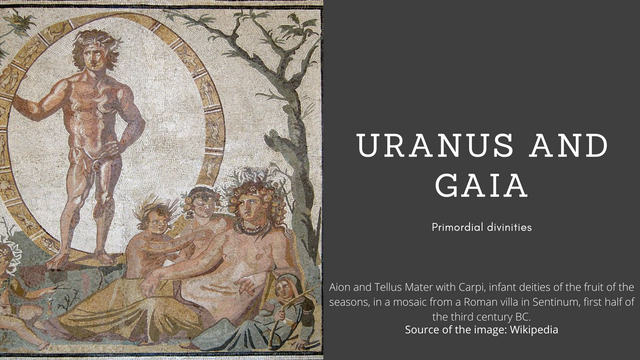Greco-roman mythology: Gaia and Uranus, primordial divinities
The following article was published on Spanish language in Blurt on January 9th, 2021.
In the last post, we addressed the creation of the universe from Hesiod's Theogony. We saw how Chaos gives origin to the dark Nyx and Erebus, who in turn beget Ether and Day. Likewise, we mentioned two characters that today we are going to expose in a slightly broader way: Gaia (Terra in Roman mythology) and Uranus (Caelus in Roman mythology).
Creator Gods
(138) But afterwards she lay with Heaven and bare deep-swirling Oceanus, Coeus and Crius and Hyperion and Iapetus, Theia and Rhea, Themis and Mnemosyne and gold-crowned Phoebe and lovely Tethys. After them was born Cronos the wily, youngest and most terrible of her children, and he hated his lusty sire.
(ll. 139-146) And again, she bare the Cyclopes, overbearing in spirit, Brontes, and Steropes and stubborn-hearted Arges (6), who gave Zeus the thunder and made the thunderbolt: in all else they were like the gods, but one eye only was set in the midst of their fore-heads. And they were surnamed Cyclopes (Orb-eyed) because one orbed eye was set in their foreheads. Strength and might and craft were in their works.
(ll. 147-163) And again, three other sons were born of Earth and Heaven, great and doughty beyond telling, Cottus and Briareos and Gyes, presumptuous children. From their shoulders sprang an hundred arms, not to be approached, and each had fifty heads upon his shoulders on their strong limbs, and irresistible was the stubborn strength that was in their great forms. For of all the children that were born of Earth and Heaven, these were the most terrible, and they were hated by their own father from the first.
And he used to hide them all away in a secret place of Earth so soon as each was born, and would not suffer them to come up into the light: and Heaven rejoiced in his evil doing (Theogony. Hesiod)
As can be seen in the previous paragraphs, Gaia and Uranus had a fruitful offspring that would constitute the first divine generation (the Titans) and the first generation of monstrous beings (the Cyclops and the Hecatoncheires or giants with 100 hands and 50 heads). Offspring to which Uranus feared to lose power, so he chose to keep them all hidden inside his mother consort.
As a result, Gaia decided to gather her children and ask for their help, as she wanted to escape the undesirable visits of Uranus. Of all the children, Cronus was the one who offered to free his mother from him; the act with which he freed his mother was castration, the violent removal of the genitals. A striking aspect of this episode is that the creative act does not end there: from the blood and semen of Uranus are born the Erinyes, the Meliae, the Giants and Aphrodite, the goddess of love and sexuality.
Power and survival struggle
Now, this myth can have different interpretations. Phillip Wilkinson (2019) points out that the relationship of these primordial beings represents the eternal conflict present in the different aspects of existence. Perhaps the author was referring to the constant conflicts of survival, where the strongest and the best fits prevail over the weak.
In another side, Gordon Cheers (2019) explains that Uranus' attitude stems from a probable fear of suffering the supposed fate of Chaos, who was overthrown by Erebus (although Hesiod didn't mention this supposed rebellion). This interpretation particularly synthesizes a struggle for power within a single family, an event that has happened throughout the history of mankind in different parts of the world, especially within the European royal houses.
The irony in this myth is that Cronus succumbs to that same fear later, with consequences much more serious than castration. But that's another story to be addressed in the next few weeks.
